 Libri di Adorno Theodor W. su Unilibro.it) Libri di Adorno Theodor W. su Unilibro.it)
|
|
2004 |
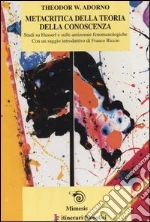 Title :
Metacritica della teoria della conoscenza. Studi su Husserl e sulle antinomie fenomenologiche
Title :
Metacritica della teoria della conoscenza. Studi su Husserl e sulle antinomie fenomenologicheAuthor: Adorno Theodor W. Publisher: Mimesis "Metacritica della teoria della conoscenza" è un testo in cui Adorno nel 1956 raccolse i suoi saggi sulle teorie fenomenologiche di Husserl. Ma il valore di quest'opera è ancor più significativo, in quanto investe il tema più generale della filosofia della scienza e della critica della conoscenza. Adorno rileva come il culto acritico del dato, il mito dell'originarietà e dell'immediatezza e la malcelata subalternità di Husserl stesso nei confronti delle scienze, siano tali da provocare un atteggiamento meramente descrittivo rispetto alla realtà. € 16,00
|
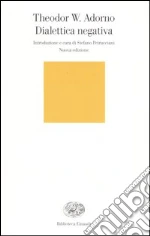 Title :
Dialettica negativa
Title :
Dialettica negativaAuthor: Adorno Theodor W.; Petrucciani S. (cur.) Publisher: Einaudi Scritta tra il 1959 e il 1966 è l'opera più organica e probabilmente il vertice filosofico di Adorno, il sistema di un pensatore profondamente antisistematico. Dopo un'introduzione in cui lo spirito di sistema viene contrapposto al procedimento dell'esperienza filosofica, Adorno avanza una critica dell'ontologia e delinea il movimento della dialettica negativa, che culminando nel riconoscimento del primato dell'oggetto, diventa dialettica materialistica, ma di un materialismo "senza immagini", opposto alla "coscienza reificata" del materialismo dialettico. La dialettica negativa viene poi applicata a "modelli" che corrispondono ad alcuni concetti chiave della filosofia: la libertà, la storia e la metafisica. € 30,00
Scontato: € 28,50
|
|
2003 |
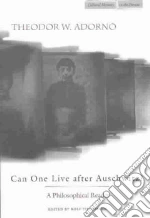 Title :
Can One Live After Auschwitz
Title :
Can One Live After AuschwitzAuthor: Adorno Theodor W., Tiedemann Rolf (EDT) Publisher: Stanford Univ Pr This is a comprehensive collection of readings from the work of Theodor Adorno, one of the most influential German thinkers of the twentieth century. What took place in Auschwitz revokes what Adorno termed the ?Western legacy of positivity,” the innermost substance of traditional philosophy. The prime task of philosophy then remains to reflect on its own failure, its own complicity in such events. Yet in linking the question of philosophy to historical occurrence, Adorno seems not to have abandoned his paradoxical, life-long hope that philosophy might not be entirely closed to the idea of redemption. He prepares for an altogether different praxis, one no longer conceived in traditionally Marxist terms but rather to be gleaned from ?metaphysical experience.” In this collection, Adorno's literary executor has assembled the definitive introduction to his thinking. Its five sections anatomize the range of Adorno's concerns: ?Toward a New Categorical Imperative,” ?Damaged Life,” ?Administered World, Reified Thought,” ?Art, Memory of Suffering,” and ?A Philosophy That Keeps Itself Alive.” A substantial number of Adorno's writings included appear here in English for the first time. This collection comes with an eloquent introduction from Rolf Tiedemann, the literary executor of Adorno's work. € 35,50
|
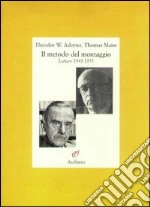 Title :
Il metodo del montaggio. Lettere 1943-1955
Title :
Il metodo del montaggio. Lettere 1943-1955Author: Adorno Theodor W.; Mann Thomas Publisher: Archinto € 17,50
|
|
2002 |
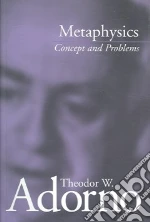 Title :
Metaphysics
Title :
MetaphysicsAuthor: Adorno Theodor W., Tiedemann Rolf (EDT), Jephcott Edmund (TRN) Publisher: Stanford Univ Pr This volume makes available in English for the first time Adorno's lectures on metaphysics. It provides a unique introduction not only to metaphysics but also to Adorno's own intellectual standpoint, as developed in his major work Negative Dialectics. Metaphysics for Adorno is defined by a central tension between concepts and immediate facts. Adorno traces this dualism back to Aristotle, whom he sees as the founder of metaphysics. In Aristotle it appears as an unresolved tension between form and matter. This basic split, in Adorno's interpretation, runs right through the history of metaphysics. Perhaps not surprisingly, Adorno finds this tension resolved in the Hegelian dialectic. Underlying this dualism is a further dichotomy, which Adorno sees as essential to metaphysics: while it dissolves belief in transcendental worlds by thought, at the same time it seeks to rescue belief in a reality beyond the empirical, again by thought. It is to this profound ambiguity, for Adorno, that the metaphysical tradition owes its greatness. The major part of these lectures, given by Adorno late in his life, is devoted to a critical exposition of Aristotle's thought, focusing on its central ambiguities. In the last lectures, Adorno's attention switches to the question of the relevance of metaphysics today, particularly after the Holocaust. He finds in metaphysical experiences, which transcend rational discourse without lapsing into irrationalism, a last precarious refuge of the humane truth to which his own thought always aspired. This volume will be essential reading for anyone interested in Adorno's work and will be a valuable text for students and scholars of philosophy and social theory. € 24,30
|
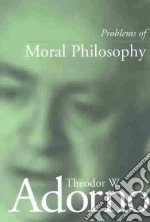 Title :
Problems of Moral Philosophy
Title :
Problems of Moral PhilosophyAuthor: Adorno Theodor W., Schroder Thomas (EDT), Livingstone Rodney (TRN) Publisher: Stanford Univ Pr Theodor W. Adorno (1903-1969), one of the leading social thinkers of the twentieth century, long concerned himself with the problems of moral philosophy, or ?whether the good life is a genuine possibility in the present.” This book consists of a course of seventeen lectures given in May-July 1963. Captured by tape recorder (which Adorno called ?the fingerprint of the living mind”), these lectures present a somewhat different, and more accessible, Adorno from the one who composed the faultlessly articulated and almost forbiddingly perfect prose of the works published in his lifetime. Here we can follow Adorno's thought in the process of formation (he spoke from brief notes), endowed with the spontaneity and energy of the spoken word. The lectures focus largely on Kant, ?a thinker in whose work the question of morality is most sharply contrasted with other spheres of existence.” After discussing a number of the Kantian categories of moral philosophy, Adorno considers other, seemingly more immediate general problems, such as the nature of moral norms, the good life, and the relation of relativism and nihilism. In the course of the lectures, Adorno addresses a wide range of topics, including: theory and practice, ethics as bad conscience, the repressive character, the problem of freedom, dialectics in Kant and Hegel, the nature of reason, the moral law as a given, psychoanalysis, the element of the Absurd, freedom and law, the Protestant tradition of morality, Hamlet, self-determination, phenomenology, the concept of the will, the idea of humanity, The Wild Duck, and Nietzsche's critique of morality. € 24,30
|
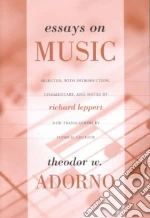 Title :
Essays on Music
Title :
Essays on MusicAuthor: Adorno Theodor W., Leppert Richard D., Gillespie Susan H. (TRN) Publisher: Univ of California Pr Theodor W. Adorno (1903-1969), one of the principal figures associated with the Frankfurt School, wrote extensively on culture, modernity, aesthetics, literature, and--more than any other subject--music. To this day, Adorno remains the single most influential contributor to the development of qualitative musical sociology which, together with his nuanced intertextual readings of musical works, gives him broad claim as a continuing force in the study of music. This long-awaited collection of twenty-seven essays represents the full range of Adorno's music writing. Nearly half of the essays appear in English for the first time; all of the essays are fully annotated; and the previously translated essays have been corrected and missing text restored, making this volume the definitive resource on Adorno's musical thought. € 41,20
|
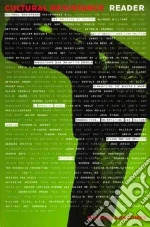 Title :
Cultural Resistance Reader
Title :
Cultural Resistance ReaderAuthor: Duncombe Stephen (EDT), Adorno Theodor W. (CON), Arnold Matthew (CON), Bakhtin Mikhail (CON) Publisher: Verso Books From the Diggers seizing St. George Hill in 1649 to Hacktivists staging virtual sit-ins in the 21st century, from the retributive fantasies of Robin Hoods to those of gangsta rappers, culture has long been used as a political weapon. This expansive and carefully crafted reader brings together many of the classic texts that help to define culture as a tool of resistance. With illuminating introductions throughout, it presents a range of theoretical and historical writings that have influenced contemporary debate, providing tools for the reader's own interventions. In these pages can be found the work of Karl Marx, Matthew Arnold, Antonio Gramsci, C.L.R. James, Bertolt Brecht, Walter Benjamin, Theodor Adorno, Virginia Woolf, Mikhail Bakhtin, Stuart Hall, Christopher Hill, Janice Radway, Eric Hobsbawm, Abbie Hoffman, Mahatma Gandhi, Dick Hebdige, Hakim Bey, Raymond Williams, Robin Kelley, Tom Frank and more than a dozen others, including a number of new activists/authors published here for the first time. € 26,80
|
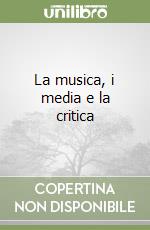 Title :
La musica, i media e la critica
Title :
La musica, i media e la criticaAuthor: Adorno Theodor W.; Cuomo V. (cur.) Publisher: TempoLungo € 20,00
|
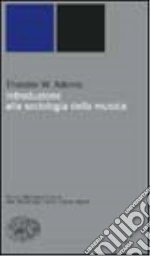 Title :
Introduzione alla sociologia della musica
Title :
Introduzione alla sociologia della musicaAuthor: Adorno Theodor W. Publisher: Einaudi € 23,00
Scontato: € 21,85
|
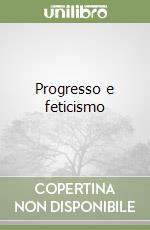 Title :
Progresso e feticismo
Title :
Progresso e feticismoAuthor: Adorno Theodor W. Publisher: Mimesis € 13,00
|
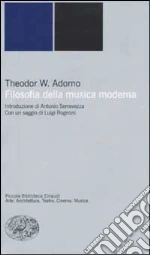 Title :
Filosofia della musica moderna
Title :
Filosofia della musica modernaAuthor: Adorno Theodor W. Publisher: Einaudi la "Filosofia della musica moderna" di Theodor W. Adorno può a buon diritto essere annoverata tra gli esiti piú alti della riflessione musicologica e filosofica del secondo Novecento. Nell'interpretazione di Adorno le linee di fondo del Novecento musicale sono rappresentate da due figure contrapposte, Schönberg e Strawinsky, la cui opera, profondamente immersa nella dialettica storica, riflette le ansie, i timori, le contraddizioni e la violenza del tempo. I due compositori, attraverso la musica, rivelano in vario modo la crisi del soggetto, minacciato da forme di dominio che avversano o spengono ogni aspirazione alla libertà. € 20,00
Scontato: € 19,00
|
 Title :
Dialectic of Enlightenment
Title :
Dialectic of EnlightenmentAuthor: Horkheimer Max, Adorno Theodor W., Schmid Noerr Gunzelin (TRN) Publisher: Stanford Univ Pr Dialectic of Enlightenment is undoubtedly the most influential publication of the Frankfurt School of Critical Theory. Written during the Second World War and circulated privately, it appeared in a printed edition in Amsterdam in 1947. "What we had set out to do," the authors write in the Preface, "was nothing less than to explain why humanity, instead of entering a truly human state, is sinking into a new kind of barbarism." Yet the work goes far beyond a mere critique of contemporary events. Historically remote developments, indeed, the birth of Western history and of subjectivity itself out of the struggle against natural forces, as represented in myths, are connected in a wide arch to the most threatening experiences of the present. The book consists in five chapters, at first glance unconnected, together with a number of shorter notes. The various analyses concern such phenomena as the detachment of science from practical life, formalized morality, the manipulative nature of entertainment culture, and a paranoid behavioral structure, expressed in aggressive anti-Semitism, that marks the limits of enlightenment. The authors perceive a common element in these phenomena, the tendency toward self-destruction of the guiding criteria inherent in enlightenment thought from the beginning. Using historical analyses to elucidate the present, they show, against the background of a prehistory of subjectivity, why the National Socialist terror was not an aberration of modern history but was rooted deeply in the fundamental characteristics of Western civilization. Adorno and Horkheimer see the self-destruction of Western reason as grounded in a historical and fateful dialectic between the domination of external nature and society. They trace enlightenment, which split these spheres apart, back to its mythical roots. Enlightenment and myth, therefore, are not irreconcilable opposites, but dialectically mediated qualities of both real and intellectual life. "Myth is already enlightenment, and enlightenment reverts to mythology." This paradox is the fundamental thesis of the book. This new translation, based on the text in the complete edition of the works of Max Horkheimer, contains textual variants, commentary upon them, and an editorial discussion of the position of this work in the development of Critical Theory. € 71,50
|
|
2001 |
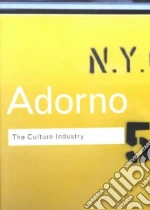 Title :
The Culture Industry
Title :
The Culture IndustryAuthor: Adorno Theodor W., Bernstein J. M. (EDT), Bernstein J. M. (INT) Publisher: Routledge The creation of the Frankfurt School of critical theory in the 1920s saw the birth of some of the most exciting and challenging writings of the twentieth century. It is out of this background that the great critic Theodor Adorno emerged. His finest essays are collected here, offering the reader unparalleled insights into Adorno's thoughts on culture. He argued that the culture industry commodified and standardized all art. In turn this suffocated individuality and destroyed critical thinking. At the time, Adorno was accused of everything from overreaction to deranged hysteria by his many detractors. In today's world, where even the least cynical of consumers is aware of the influence of the media, Adorno's work takes on a more immediate significance. The Culture Industry is an unrivalled indictment of the banality of mass culture. € 27,10
|
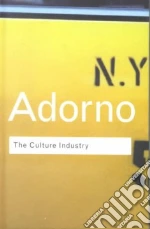 Title :
The Culture Industry
Title :
The Culture IndustryAuthor: Adorno Theodor W., Bernstein J. M. (EDT) Publisher: Routledge The creation of the Frankfurt School of critical theory in the 1920s saw the birth of some of the most exciting and challenging writings of the twentieth century. It is out of this background that the great critic Theodor Adorno emerged. His finest essays are collected here, offering the reader unparalleled insights into Adorno's thoughts on culture. He argued that the culture industry commodified and standardized all art. In turn this suffocated individuality and destroyed critical thinking. At the time, Adorno was accused of everything from overreaction to deranged hysteria by his many detractors. In today's world, where even the least cynical of consumers is aware of the influence of the media, Adorno's work takes on a more immediate significance. The Culture Industry is an unrivalled indictment of the banality of mass culture. € 159,70
|
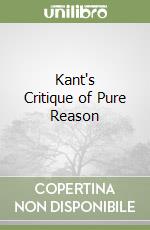 Title :
Kant's Critique of Pure Reason
Title :
Kant's Critique of Pure ReasonAuthor: Theodor W. Adorno Publisher: BLACKWELL PUBLISHERS € 23,50
|
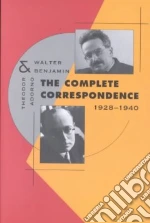 Title :
The Complete Correspondence, 1928-1940
Title :
The Complete Correspondence, 1928-1940Author: Adorno Theodor W., Benjamin Walter Publisher: Harvard Univ Pr The correspondence between Walter Benjamin and Theodor Adorno, which appears here for the first time in its entirety in English translation, must rank among the most significant to have come down to us from that notable age of barbarism, the twentieth century. Benjamin and Adorno formed a uniquely powerful pair. Benjamin, riddle-like in his personality and given to tactical evasion, and Adorno, full of his own importance, alternately support and compete with each other throughout the correspondence, until its imminent tragic end becomes apparent to both writers. Each had met his match, and happily, in the other. This book is the story of an elective affinity. Adorno was the only person who managed to sustain an intimate intellectual relationship with Benjamin for nearly twenty years. No one else, not even Gershom Scholem, coaxed so much out of Benjamin. The more than one hundred letters in this book will allow readers to trace the developing character of Benjamin's and Adorno's attitudes toward each other and toward their many friends. When this book appeared in German, it caused a sensation because it includes passages previously excised from other German editions of the letters--passages in which the two friends celebrate their own intimacy with frank remarks about other people. Ideas presented elliptically in the theoretical writings are set forth here with much greater clarity. Not least, the letters provide material crucial for understanding the genesis of Benjamin's Arcades Project. € 46,60
|
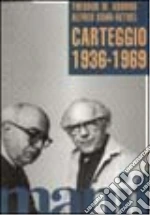 Title :
Carteggio 1936-1969. Il rapporto tra due grandi intellettuali dagli anni del nazismo e dell'esilio a quelli della nuova Germania
Title :
Carteggio 1936-1969. Il rapporto tra due grandi intellettuali dagli anni del nazismo e dell'esilio a quelli della nuova GermaniaAuthor: Adorno Theodor W.; Sohn Rethel Alfred Publisher: Manifestolibri € 18,07
|
|
|
2000 |
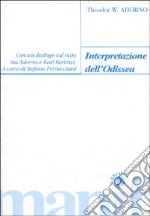 Title :
Interpretazione dell'Odissea. Con un dialogo sul mito tra Adorno e Karl Kerényi
Title :
Interpretazione dell'Odissea. Con un dialogo sul mito tra Adorno e Karl KerényiAuthor: Adorno Theodor W.; Petrucciani S. (cur.) Publisher: Manifestolibri € 12,91
|
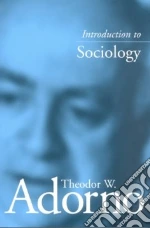 Title :
Introduction to Sociology
Title :
Introduction to SociologyAuthor: Adorno Theodor W., Godde Christoph, Jephcott Edmund (TRN) Publisher: Stanford Univ Pr Introduction to Sociology distills decades of distinguished work in sociology by one of this century's most influential thinkers in the areas of social theory, philosophy, aesthetics, and music. It consists of a course of seventeen lectures given by Theodor W. Adorno in May-July 1968, the last lecture series before his death in 1969. Captured by tape recorder (which Adorno called ?the fingerprint of the living mind”), these lectures present a somewhat different, and more accessible, Adorno from the one who composed the faultlessly articulated and almost forbiddingly perfect prose of the works published in his lifetime. Here we can follow Adorno's thought in the process of formation (he spoke from brief notes), endowed with the spontaneity and energy of the spoken word. The lectures form an ideal introduction to Adorno's work, acclimatizing the reader to the greater density of thought and language of his classic texts. Delivered at the time of the ?positivist dispute” in sociology, Adorno defends the position of the ?Frankfurt School” against criticism from mainstream positivist sociologists. He sets out a conception of sociology as a discipline going beyond the compilation and interpretation of empirical facts, its truth being inseparable from the essential structure of society itself. Adorno sees sociology not as one academic discipline among others, but as an over-arching discipline that impinges on all aspects of social life. Tracing the history of the discipline and insisting that the historical context is constitutive of sociology itself, Adorno addresses a wide range of topics, including: the purpose of studying sociology; the relation of sociology and politics; the influence of Saint-Simon, Comte, Durkheim, Weber, Marx, and Freud; the contributions of ethnology and anthropology; the relationship of method to subject matter; the problems of quantitative analysis; the fetishization of science; and the separation of sociology and social philosophy. € 22,40
|
|
1998 |
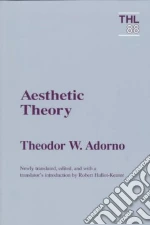 Title :
Aesthetic Theory
Title :
Aesthetic TheoryAuthor: Adorno Theodor W. Publisher: Univ of Minnesota Pr € 29,80
|
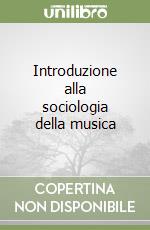 Title :
Introduzione alla sociologia della musica
Title :
Introduzione alla sociologia della musicaAuthor: Adorno Theodor W. Publisher: Einaudi € 17,56
|
|
1997 |
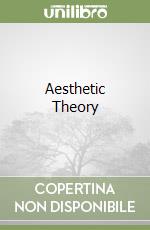 Title :
Aesthetic Theory
Title :
Aesthetic TheoryAuthor: Adorno Theodor W., Adorno Gretel, Tiedeman Rolf Publisher: Univ of Minnesota Pr € 88,20
|
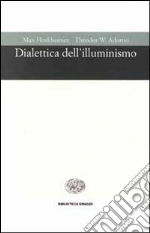 Title :
Dialettica dell'illuminismo
Title :
Dialettica dell'illuminismoAuthor: Horkheimer Max; Adorno Theodor W. Publisher: Einaudi € 24,00
|
|
1996 |
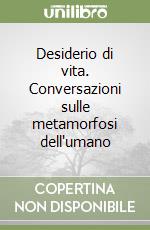 Title :
Desiderio di vita. Conversazioni sulle metamorfosi dell'umano
Title :
Desiderio di vita. Conversazioni sulle metamorfosi dell'umanoAuthor: Adorno Theodor W.; Canetti Elias; Gehlen Arnold; Fadini U. (cur.) Publisher: Mimesis € 10,33
|
|
|
1994 |
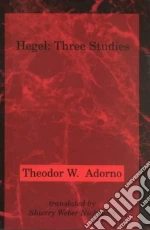 Title :
Hegel
Title :
HegelAuthor: Adorno Theodor W., Nicholsen Shierry Webber (TRN) Publisher: Mit Pr This short masterwork in twentieth-century philosophy provides both a major reinterpretation of Hegel and insight into the evolution of Adorno's critical theory. The first study focuses on the relationship of reason, the individual, and society in Hegel, defending him against the criticism that he was merely an apologist for bourgeois society. The second study examines the experiential content of Hegel's idealism, considering the notion of experience in relation to immediacy, empirical reality, science, and society. The third study, "Skoteinos," is an unusual and fascinating essay in which Adorno lays out his thoughts on understanding Hegel. In his reflections, which spring from his experience teaching at the Goethe University in Frankfurt, questions of textual and philosophical interpretation are intertwined.Rescuing the truth value of Hegel's work is a recurring theme of the critical theory of the Frankfurt School, and nowhere is this goal pursued with more insight than in these three studies. The core problem Adorno sets for himself is how to read Hegel in a way that comprehends both the work and its historical context, thereby allowing conclusions to be drawn that may seem on the surface to be exactly opposed to what Hegel wrote but that are, nevertheless, valid as the present truth of the work. It is the elaboration of this method of interpretation, a negative dialectic, that was Adorno's underlying goal.Adorno's efforts to salvage the contemporaneity of Hegel's thought form part of his response to the increasingly tight net of social control in the aftermath of World War II. In this, his work is related to the very different attempts to undermine reified thinking undertaken by the various French theorists. The continued development of what Adorno called "the administered world" has only increased the relevance of his efforts. € 28,10
|
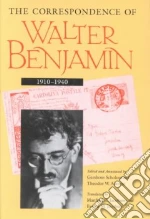 Title :
The Correspondence of Walter Benjamin, 1910-1940
Title :
The Correspondence of Walter Benjamin, 1910-1940Author: Benjamin Walter, Scholem Gershom, Adorno Theodor W. (EDT), Adorno Theodor W. Publisher: Univ of Chicago Pr Called "the most important critic of his time" by Hannah Arendt, Walter Benjamin has emerged as one of the most compelling thinkers of our time as well, his work assuming a crucial place in current debates over the interactions of art, culture, and meaning. A "natural and extraordinary talent for letter writing was one of the most captivating facets of his nature," writes Gershom Scholem in his Foreword; and indeed, Benjamin's correspondence reveals the evolution of some of his most powerful ideas. Published here in English for the first time, these letters offer an intimate picture of Benjamin himself and the times in which he lived. Written in a day when letters were an important vehicle for the presentation and development of intellectual matters, Benjamin's correspondence is rich in insight into the circumstances behind his often difficult work. These letters provide a lively view of Benjamin's life and thought from his days as a student to his melancholy experiences as an exile in Paris. As he defends his changing ideas to admiring and skeptical friends - poets, philosophers, and radicals - we witness the restless self-analysis of a creative mind far in advance of his own time. Writing at length to Scholem and Theodor Adorno, and exchanging letters with Rainer Maria Rilke, Hannah Arendt, Hugo von Hofmannsthal, Max Horkheimer, Max Brod, Bertolt Brecht, and Kafka's friend Felix Weltsch, Benjamin elaborates his ideas about metaphor and language. He reflects on literary figures from Kafka to Karl Kraus, the "Jewish Question" and anti-Semitism, Marxism and Zionism. And he expounds his personal attitudes toward such subjects as the role of quotations in criticism, history, and tradition; the meaning of being a "collector"; and French culture and the national character. In sum, this magnificent collection is an exceptionally rich source of information and an essential key to understanding one of the preeminent figures of modern culture. € 37,10
|
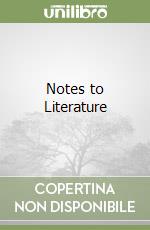 Title :
Notes to Literature
Title :
Notes to LiteratureAuthor: Adorno Theodor W., Nicholsen Shierry Weber (TRN) Publisher: Columbia Univ Pr € 39,30
|
|
1993 |
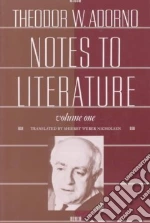 Title :
Notes to Literature
Title :
Notes to LiteratureAuthor: Adorno Theodor W., Tiedemann Rolf (EDT) Publisher: Columbia Univ Pr € 39,30
|
|
|
1990 |
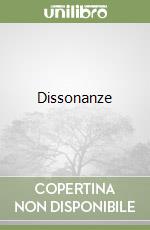 Title :
Dissonanze
Title :
DissonanzeAuthor: Adorno Theodor W.; Manzoni G. (cur.) Publisher: Feltrinelli € 20,66
|
|

|

|

|

|